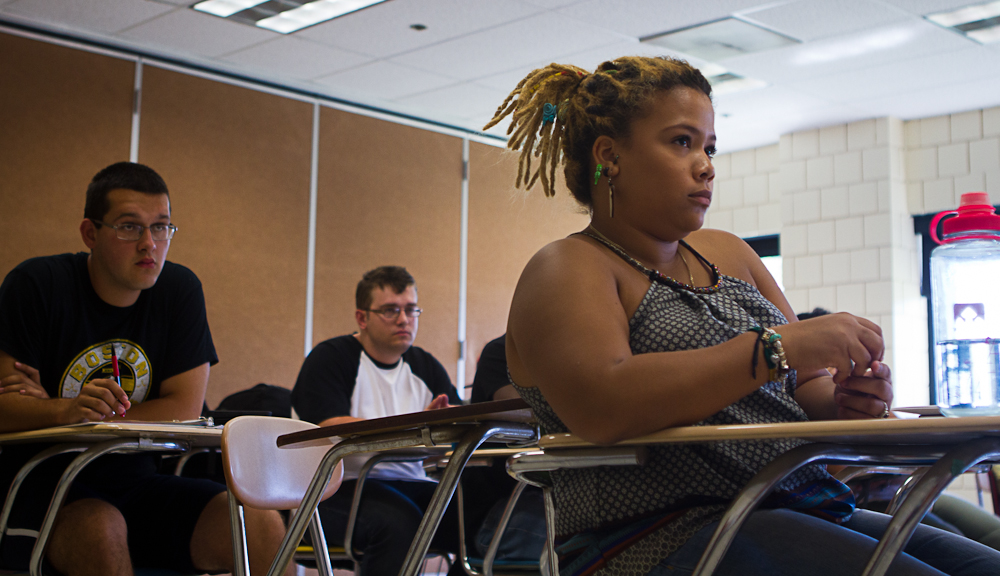
Natalia Pagan-Saurez sits in one of her many orientation sessions before starting classes at North Shore Community College. Pagan-Saurez will be taking remedial math this fall (Mallory Noe-Payne/WGBH).
As community colleges assume a more central role in the nation's higher education landscape, the question of how prepared graduating high school students are is increasingly important. Some states are trying to improve the quality of, and change the way students think about, remedial education.
It's orientation week at North Shore Community College in Lynn, Massachusetts. On this hot and humid afternoon, students pack into air-conditioned classrooms. Orientation leaders cover the gamut -- from financial aid to maximizing your college experience.
"Being well-rounded socially, academically, physically, mentally, psychologically, all of that makes a difference in terms of who you are as an overall person, inside and out," says one of the orientation leader as she discusses ways to get involved.
Many of these students, though, aren't worried about what they'll be doing outside the classroom. They're thinking, instead, about getting an associate's degree, without wasting time or money. But a lot of them are forced to enroll in courses that won't give them any credit at all.
Natalia Pagan-Saurez is in that boat. The 17-year-old earned good grades in high school, but she'll be taking remedial math this fall.
"I've never felt like I've been caught up with math. I always felt like I was missing something, like everyone knew something I didn't know," says Pagan-Saurez.
Like all the students here, Natalia took a a placement test. According to her results, she was proficient in English, which isn't even her first language, but she wasn't ready for college-level math. So she has to pay money up front for the remedial course that will bring her up to speed, before she can even think about taking credit-bearing math classes.
"I think the most frustrating element is that I didn't have that structure in high school," Pagan-Saurez says. "I feel like if I would have had that, I wouldn't be in the situation I'm in right now."
Natalia isn't alone. For every ten freshmen in the U.S. seeking an associate's degree, five require some form of developmental education. That can be disrupting to college plans, and discouraging, even to motivated students like Natalia who have a plan.
"When I first got the news I was freaking out a little bit, just about my financial aid, my courses, how it was going to delay my progress in college," Pagan-Saurez says. "I do want to transfer out of North Shore Community College after two years."
Educators have likened the situation to educational quicksand. It's easy for students to get stuck and never earn their degree. In fact, fewer than a third of the students who have to take developmental classes end up graduating within three years.
"Colleges really are not doing a very good job of assessing students, determining whether or not they can be successful in college," says Bruce Vandal, vice president of the nonprofit Complete College America.
According to Vandal, one major problem is with the entrance exams that many community colleges use to place students in remedial courses.
"There's some indication that upwards of about 50 percent of students who are placed into remedial education could actually be successful if they were placed into a college course," says Vandal.
So why are community colleges finding students so unprepared? Vandal says one challenge is that colleges aren't making their standards known to high schools.
At Bunker Hill Community College in Boston, President Pam Eddinger says the school used to simply test students, place them in courses, and then give them three years to earn their degree.
“That’s a lifetime for somebody. We’re beginning to realize that that doesn't work," Eddinger says. "At every level you lose 50 percent of your students. That is not OK.”
So now Bunker Hill and other community colleges are trying out new approaches to get more students into credit-bearing courses faster. One idea is to identify struggling students and enroll them in remedial coursework while they’re still in high school.
"We’ve developed something called boot camp – a four-week intensive skill building," Eddinger says. "We test them before they start. And when we test them again 50 percent of those students go up a level.”
Another approach is to allow students to forgo remedial education altogether. Bruce Vandal says schools should put students right into college courses and then provide mentors and coaches.
"We're finding that those students perform just as well, and in some cases even better, by getting additional support in those courses," says Vandal.
Seven states, including Indiana, Texas and Colorado, have committed to that new approach. And in Connecticut, the state legislature passed a bill requiring colleges and universities to rethink the delivery of developmental education.
Here in Massachusetts, the Board of Higher Education voted to give campuses the ability to use high school GPA, instead of high-stakes placement exams,to determine what coursework students should be taking.










